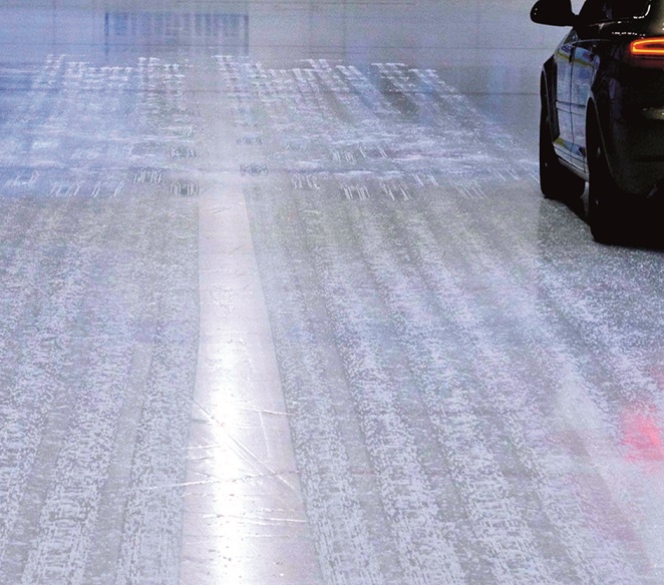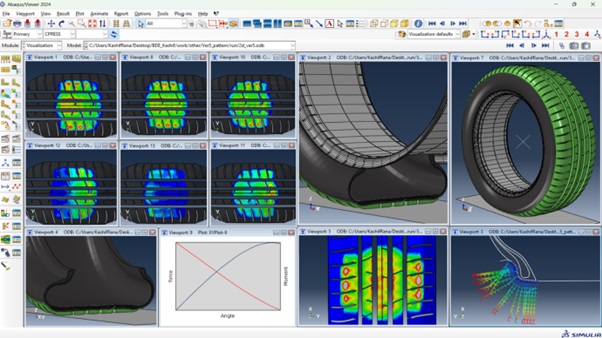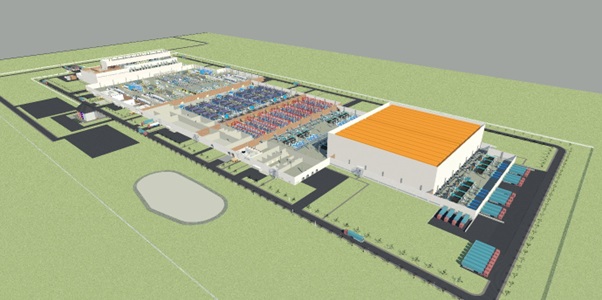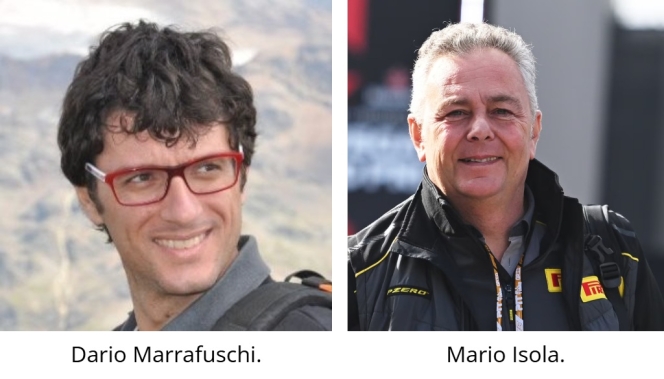Real-World Testing: A Timeless Necessity For The Tyre Industry
- By Sharad Matade & Gaurav Nandi
- December 26, 2024

Making a tyre is an extensive process that includes everything from formulation to testing. With the advancement in software-defined technology, tyre testing is increasing within a simulated environment. However, as real as the rubber wheel is, its testing in real-world environment stands as imminent in future course despite the current trend of simulation.
Alluding to this, Black Donuts Head of Tyre and Material Development Ilkka Lehtoranta told Tyre Trends, “Alongside the advanced laboratory equipment and various simulation methods, real-world tyre testing remains essential now and in the future. Physical testing in diverse conditions is critical for final evaluation and validation. Real-world tyre testing will continue to play a significant role moving forward. At Black Donuts, we offer comprehensive tyre testing services through our subsidiary, BD Testing. This company specialises in outdoor testing to ensure that products perform reliably in all environments.”
Commenting on the role of simulation in tyre development, he said, “Simulation plays a critical role in tyre development, offering a proven and essential part of the design process. One key type of simulation is finite element analysis (FEA), a mathematical method used to model and simulate physical phenomena. FEA is widely employed across industrial sectors including tyre manufacturing to predict and validate design performance before creating physical prototypes.”

“For tyre development, simulation tools provide significant advantages. By conducting design verification and validation virtually, companies can reduce the need to produce experimental tyre, which saves raw materials and minimises waste. This approach not only supports environmental goals but also accelerates the development timeline, allowing for faster iterations and refinements. Black Donuts integrates various simulation methods into its development process, heavily relying on the results to optimise designs,” he added.
Testing facilities
The Finnish company offers comprehensive tyre testing services with a primary focus on outdoor testing rather than indoor facilities. While indoor testing facilities are widely available globally, including in Europe, Asia, India and North America, Black Donuts has chosen to concentrate on outdoor testing. The company leverages the expertise of skilled test engineers and drivers, who understand the nuances of environmental and external factors, to deliver dependable testing outcomes.
“We operate a proving ground in northern Sweden, where winter tyres are tested under snowy and icy conditions. Additionally, we have a testing centre in Finland’s Tampere region, which serves as a hub for evaluating tyre properties across a range of conditions. The facilities enable grip testing on ice, snow, wet and dry surfaces; noise testing for internal and external evaluations; handling and comfort assessments; aquaplaning analysis and tailored tests developed to meet specific customer needs,” informed Lehtoranta.
He mentioned that test drivers are central to Black Donuts' outdoor testing process as their expertise in assessing tyre behaviour is critical for validating designs and providing feedback to engineers. This collaboration ensures the test results are seamlessly integrated into the design and development process, allowing engineers to refine tyre properties based on real-world performance insights.

Winter testing is conducted during the colder months to utilise natural snow and ice conditions. While the company does not have an indoor snow-testing facility, it makes use of local resources such as ice halls for ice-related evaluations. For summer tyres, the focus shifts to testing grip, handling and noise levels under both dry and wet conditions.
In addition to testing during tyre development, Black Donuts supports homologation and certification processes. Through its subsidiary, BD Testing, the company provides accredited testing services and official test reports required for certifications by authorities. This includes European homologation tests for snow and ice performance, as well as specialised assessments such as road wear impact evaluations for studded tyres in Scandinavian markets.
The company also conducts internal testing to collect data, monitor market trends and benchmark tyre performance. “This continuous research helps us to identify industry standards and emerging trends, ensuring that our tyre development projects remain innovative and competitive,” averred Lehtoranta.
Industry peek
Black Donuts provides end-to-end solutions for the global tyre industry, catering to both manufacturing and tyre research and development needs. Its services cover tyre design and production, materials research and development, making the company a comprehensive partner for tyre manufacturers globally. Whether supporting the establishment of new tyre plants, upgrading existing facilities or offering specific technical expertise, it has a broad portfolio of engineering and technological solutions.
In production, Black Donuts assists manufacturers with everything from setting up greenfield projects to improving brownfield facilities. For existing manufacturing lines, the company conducts thorough audits to identify bottlenecks, inefficiencies and quality issues. The focus often includes increasing automation, enhancing productivity, reducing manufacturing costs, improving quality, minimising scrap and waste and even reducing tyre weight. These solutions are tailored to meet the specific demands of the client.
For greenfield projects, it offers turnkey solutions. These include site selection support, plant layout design, architectural planning, defining machinery specifications, automation strategies and utility calculations. During the execution phase, an on-site engineering team supervises construction, machinery installation, commissioning and the ramp-up of production processes. The company also trains operators, troubleshoots quality issues and supports clients in improving efficiency. The level of post-production support is flexible with options for ongoing assistance tailored to the client's needs.

Alluding to how the design and production process differ across regions, the executive said, “The design and production processes themselves are generally consistent across regions. However, automation levels may vary based on factors like labour costs and plant location. European facilities, for instance, often require higher automation levels due to higher manpower costs, though automation is increasingly being adopted in Asia as well. This trend has significantly reduced manpower requirements in tyre manufacturing globally, driven by advancements in automation technologies.”
Research and development
In tyre development, significant trends include the growing demand for sustainability, increased automation in production processes and evolving design needs tailored to regional and market-specific conditions. Tyre materials development is a subset of tyre development but is critical due to its role in addressing environmental and performance challenges. Black Donuts works on both these aspects, helping clients innovate while navigating changing demands in the tyre industry.
The push for sustainability is the most pressing challenge in tyre material development. There is an increasing emphasis on replacing fossil-based materials with sustainable alternatives like bio-based and recycled raw materials. Black Donuts plays a pivotal role in identifying and testing new materials available in the market, integrating them into tyre compounds and ensuring its compatibility with production processes.
In addition to working with existing materials, Black Donuts has initiated its own research and development efforts to explore innovative, out-of-the-box sustainable solutions. These include new bio-based raw materials currently under internal development, which are expected to be launched soon.
On the tyre development front, it offers comprehensive services for creating new tyre lines across segments like passenger car radial (PCR), truck and bus radial (TBR) and off-the-road (OTR) tyres. The designs cater to various markets including Europe, US, Asia and Africa, ensuring optimal performance under different environmental and regulatory conditions.
Customisation for specific client needs, whether summer or winter tyres, and adapting designs to suit regional preferences are also part of the company's everyday operations.
Competitive edge
The rapid evolution of technology, automation and sustainability trends demands agility and adaptability. Black Donuts maintains an active presence in the market, staying updated on global developments by leveraging its extensive partner network, including machinery and raw material suppliers, to gather insights and anticipate emerging trends.
 Alluding how the company selects partners, the executive revealed, “The partner selection process is fundamental to delivering high-quality, innovative solutions. Many members of our team have decades of experience and longstanding relationships with suppliers, which provide a solid foundation for selecting trusted partners. Besides, there are several factors that are taken into account to source new partners.”
Alluding how the company selects partners, the executive revealed, “The partner selection process is fundamental to delivering high-quality, innovative solutions. Many members of our team have decades of experience and longstanding relationships with suppliers, which provide a solid foundation for selecting trusted partners. Besides, there are several factors that are taken into account to source new partners.”
One of the most crucial factors in selecting partners is the technological capability. Black Donuts prioritises partners that offer cutting-edge technologies, which can add value to both the company and its customers. It also carefully evaluates the ability of potential partners to deliver machinery, raw materials and components as promised. Moreover, the company seeks partners who share values of sustainability.
While Black Donuts draws on its established relationships with trusted suppliers, the company remains proactive in sourcing new partners and exploring the latest advancements in technology and materials.
Sustainability
The executive noted that in the next five years, the proportion of renewable or bio-based materials in tyre production is expected to remain relatively modest. “Currently, aside from natural rubber, which makes up around 20 percent of tyre materials, the use of other renewable materials is almost negligible. While the industry faces challenges in sourcing and incorporating bio-based and recycled raw materials, it is estimated that within five years, the share of such materials could reach 30-35 percent of the total tyre content,” said Lehtoranta.
Alluding to industry goals of incorporating 100 percent renewable materials in tyres by 2050, he noted, “Incorporating 100 percent renewable materials in tyres is possible, but it will require collective action across the entire industry. All stakeholders must align and collaborate towards this common goal. Many mid-sized and smaller companies may struggle with this transition on its own, which is where industry partners can offer valuable support. This is also why companies are increasingly focusing on researching and developing new bio-based raw materials in order to expand the availability of these alternatives in the market. However, scaling these innovations to a commercial level remains a challenge as many promising ideas have not yet been fully realised on a large scale,” informed the official.
He also noted that achieving sustainability in tyre production will undoubtedly require significant investment. A key challenge is that sustainable raw materials are currently more expensive than conventional alternatives. Unfortunately, many end consumers are not yet willing to pay a premium for tyres made with sustainable materials.
Market presence
Black Donuts has a presence on all continents. “We have a strong market footprint, serving a wide range of regions. For instance, of the 25 largest tyre manufacturers, 20 have been or are currently our customers. We also have upcoming projects across Europe, Asia, North America, South America and Africa, highlighting our global reach and ongoing expansion,” said Lehtoranta.
He added, “In terms of revenue, our biggest business segment revolves around providing end-to-end solutions for tyre plants including services related to tyre factory setup and operations. This is the largest segment in terms of financial impact. Additionally, tyre and material development is another major part of our business contributing significantly to our overall revenue.”
North America is one of its largest markets, followed by Europe and Asia, though revenue distribution can vary year by year due to the nature of projects.
He also noted that regulations play a crucial role in driving the business. The regulation concerning studded tyres, for instance, which has been important in the European market. Winter tyre regulations, particularly the requirement for the snowflake symbol on tyres, are also significant, especially in Nordic countries.
Additionally, a newer regulation being prepared by the European Commission concerning tyre abrasion, which is becoming a more prominent issue due to sustainability concerns, is also slated to drive business.
Commenting on the same, the executive said, “Tyre abrasion, especially concerning microplastic emissions, has gained attention in Europe as tyres are recognised as a major contributor to microplastic pollution. The industry and authorities are now focusing on reducing this issue by improving tyre wear properties. The goal is to ensure that tyres generate less microplastic per kilometre driven. This is particularly relevant in regions with snowy and icy roads, where tyre performance and durability are critical.”
Furthermore, he highlighted that the difference between snow and ice significantly impacts tyre performance. Ice presents much lower friction than snow, which is why ice poses a more challenging driving condition. Tyres perform worse on ice, resulting in longer stopping distances. In regions with icy roads, like the Nordic countries, manufacturers often use studs to enhance grip on ice, improving safety by reducing braking distances.
Expansion and demand
The executive mentioned that the company is expanding in the Asian and North American markets. “While winter tyres are a big demand in these regions, it's important to note that winter tyre usage varies by region. In China, for example, there is a significant demand for winter tyres, particularly in colder regions, and Japan has a large market for them as well, with regulations encouraging its use. North America, especially in regions with harsh winters, also has a strong market for winter tyres,” said Lehtoranta.

“Despite the slowdown in the European market and concerns about the US market, we still see North America as a strong growth area for us. We haven't noticed any significant slowdown in our business there and the market remains promising. However, we also see great potential in Africa, where we are seeing a lot of investment activity,” he added.
Answering what factors led the company to explore avenues in Africa, he said, “Several factors are driving the growth potential in Africa. Currently, there is little local tyre manufacturing in the region and many countries are looking to establish local industries to boost the economies and create jobs. Additionally, Africa has significant natural resources including natural rubber and oil, which can be used to produce synthetic rubbers and other raw materials needed for tyre manufacturing. Local production would enable companies to add value by refining these raw materials into finished products like tyres, creating a more sustainable and profitable cycle.”
Commenting on future plans, he said, “Our focus will be on the entire tyre lifecycle, from raw materials to production, performance and ultimately, the end of life of the tyres. We are working on developing solutions that handle tyre disposal and recycling with the goal of creating a fully sustainable tyre manufacturing process. This approach would ensure that our products and services are environmentally friendly throughout the entire supply chain.”
Industry challenges
Tyre manufacturing factories often encounter several challenges when setting up greenfield and brownfield projects. One of the primary challenges is managing the project’s schedule and budget, ensuring that the project stays on track and within financial constraints. Another critical aspect is reaching the targeted capacity for the plant, which can be challenging given the complexities of large-scale projects.

Additionally, there are technological hurdles that the company must overcome, especially in terms of innovation and research. Developing new technologies and sustainable solutions for the industry is not an easy task and requires a long-term commitment.
In terms of business challenges, the company is focused on technological innovation and research. Developing cutting-edge technologies and creating sustainable solutions for tyre manufacturing is a key priority. However, this process is often time-consuming and requires significant effort. This is where Black Donuts’ know-how and cutting-edge solutions come into play. The company is currently focused on pushing the boundaries of what is possible within the tyre industry, particularly regarding sustainability.
Regarding operations in India, the company is in the early stages of its expansion. Although it does not have a physical office in India yet, it has begun operations under the leadership of a technical director. The goal is to develop the business in India and gradually establish a technical centre that will focus on tyre simulation and other technical areas of tyre development.

The Chinese market is another area of focus. While it is not the largest market for the company, it remains an important one, with ongoing projects and customers in China. The company recognises that China is a significant player in the global tyre industry, and it continues to engage with the market, even though it is not the biggest revenue driver.
Additionally, the company is observing a trend where manufacturing is returning from Asia to local markets, a shift that began before the pandemic and has been accelerated by it. This trend is visible in regions like Africa, North America and Europe, where companies are establishing local production to mitigate supply chain issues and reduce reliance on distant markets. This shift represents a significant opportunity for the company to expand its operations and grow its presence in these regions.
KraussMaffei Technologies Appoints Dirk Musser As New Managing Director
- By TT News
- February 27, 2026

KraussMaffei Group is set to implement a leadership transition at its subsidiary, KraussMaffei Technologies, with a change at the board level. Jörg Stech, who has served as Chairman of the Board and global head of injection moulding, automation and additive manufacturing since 2023, will be departing on 31 March 2026 at his own request. He will be succeeded by Dirk Musser, the current Head of Group Transformation at the parent company, who has been appointed as the new Managing Director effective 1 April 2026. The leadership handover between Stech and Musser is already in progress, ensuring a seamless transition.
Stech’s tenure unfolded during a difficult economic period marked by financial losses and a contracting market. He responded with decisive measures aimed at margin enhancement and balance sheet improvement, which laid the groundwork for the company's long-term stability. Under his direction, the product lineup for injection moulding and automation was revitalised with the introduction of the LRXplus linear robot, the fully electric PX series and the MC7 control system, all launched in late 2025 alongside new artificial intelligence tools. He also launched a multi-year development initiative and pushed the company into new markets, such as aerospace and drone technology, by leveraging expertise in specialised processes like ColorForm. Through a focus on operational excellence, pricing discipline and capital efficiency, Stech guided the company to a significantly more resilient position compared to three years prior, despite the persistent downturn in injection moulding.
Musser brings to his new role extensive experience in transformation and finance. In his current capacity, he has already been closely involved with KraussMaffei Technologies, collaborating with its leadership to drive strategic initiatives and enhance operational performance. His qualifications include sharp analytical abilities, a strong grasp of industrial processes and a broad international perspective. An economist by training, Musser has accumulated over 20 years of leadership experience across various technology and industrial sectors. His background includes leading major transformation and turnaround projects at CRRC New Material Technologies, where he stabilised plant earnings in North America, as well as directing operational and financial restructurings during his time at Deloitte. He has also held roles with P&L responsibility, managing global supply chains and post-merger integrations at CRONIMET and has prior experience with automotive manufacturers including Daimler and Fujian Benz Automotive in China.
Alex Li, CEO, KraussMaffei Group, said, "Jörg Stech took on responsibility in a difficult situation, set clear priorities and launched decisive initiatives. The successful market launch of the LRXplus linear robot and the all-electric PX machine series, the consistent focus on profitability and the sustainable strengthening of our balance sheet are visible results of this work. We would like to express our sincere thanks to Jörg Stech for his leadership, integrity and team spirit. We value Dirk Musser as a leader who combines strategic clarity with operational excellence. In a short period of time, he has provided vital impetus for the transformation of the group and impresses with his analytical strength, decisiveness and deep understanding of our processes – not least through his successful collaboration with the managing directors of KraussMaffei Technologies. We are convinced that he will continue on this path with clarity and creative drive to successfully align KraussMaffei Technologies."
Stech said, "After many years in an environment full of technological, economic and geopolitical challenges, I look back with great gratitude on a time in which I was always surrounded by an exceptional workforce. Together, we achieved things that many initially thought were impossible. This cooperation, this willingness to push boundaries and create something new, was a joy for me. My special thanks go to all stakeholders in the company and, of course, to all employees. I leave with respect, gratitude and the conviction that this long-established company will continue to achieve great things in the future."
Musser said, "Together with my fellow managing directors Dr Frank Szimmat and Markus Bauer, I want to resolutely drive forward the further development of KraussMaffei Technologies. Our focus is on further expanding stability and performance and taking the necessary steps to successfully position the company in a dynamic market environment. I look forward to shaping this path together with our teams.”
Dario Marrafuschi Succeeds Mario Isola As Pirelli’s Head Of Motorsport
- By TT News
- February 27, 2026

Italian tyre manufacturer Pirelli has announced that Dario Marrafuschi will become the Head of its Motorsport Business Unit, effective 1 March. He succeeds Mario Isola, who will remain with the company until 1 July to assist with the leadership transition.
Marrafuschi joined Pirelli in 2008 and has held positions within the Formula 1 Research and Development department. Most recently, he led the development of the company's road products.
He will report to Giovanni Tronchetti Provera, Executive Vice-President of Sustainability, New Mobility & Motorsport. The appointment comes as the company continues its role as the tyre supplier for various global motorsport categories.
Isola departs the company following a tenure that included the expansion of Pirelli’s motorsport operations. The company stated that Isola will pursue other professional opportunities following his departure in July.
Changing Tyre Dynamics In A Changing Car Market
- By Sharad Matade
- February 27, 2026
For Continental Tires India, the passenger vehicle market in India is entering a phase where scale and structure are finally aligning with its longstanding premium ambitions. Passenger vehicle sales reached a record 4.3 million units in 2024, expanding by 4–5 percent year on year, but it is the composition of that growth – rather than the headline volume – that is reshaping the company’s strategy. Utility vehicles now account for approximately 58 percent of total passenger vehicle sales, up sharply from about 51 percent the previous year, cementing SUVs and crossovers as the dominant force in the market.
This structural shift has direct consequences for tyre manufacturers operating at the upper end of the value spectrum. Larger vehicles bring higher kerb weights, bigger wheel diameters and greater expectations around refinement, safety and performance. For Continental, the change represents not merely an increase in addressable demand but a decisive move towards tyre categories where technology differentiation and pricing discipline can coexist.
Samir Gupta, Managing Director of Continental Tires India, calls this phase a turning point, not a temporary high. He says the surge in utility vehicles – driven by electrification and more premium cars – fundamentally changes the economics of the passenger tyre market in India.
“Let me clarify one thing first. The utility vehicle segment is no longer small. Last year, around 60 percent of passenger vehicles sold in India were utility vehicles, and including first-time buyers upgrading within this segment, the share goes beyond 65 percent,” Gupta says.

Industry data broadly supports this assessment. SUVs alone contributed close to three-fifths of all passenger vehicle sales in 2024, with compact utility vehicles accounting for a significant share of incremental volumes. The overall passenger vehicle market, at around 4.3 million units, has thus become structurally skewed towards larger formats – an inflection with long-term implications for tyre sizing, load ratings and product mix.
This shift shows in replacement demand. As vehicle footprints grow, rim diameters are increasing. “The market is clearly moving from smaller to bigger rim sizes. Demand for 17-inch and above tyres is rising sharply,” Gupta says. While these tyres are still a minority, their growth far outpaces the overall passenger tyre market.
Electrification is accelerating the shift. A substantial proportion of electric passenger vehicles sold in India today are SUVs, and Continental expects EVs to account for more than 50 percent of the passenger vehicle segment within five years. For tyre manufacturers, this creates new technical requirements – higher torque tolerance, lower rolling resistance and stringent noise control. “That creates a significant opportunity for us because our strengths lie in premium, high-performance tyres,” Gupta says.

Despite these favourable structural trends, premium tyres have historically struggled to gain traction in India. For much of the past decade, the market remained intensely price-sensitive, with tyres treated largely as commoditised replacement items. Continental’s response, Gupta explains, has been consistent rather than tactical pricing. “Right from the beginning, we have focused on fair pricing. The idea is simple – if we can clearly differentiate on performance and consistently deliver on those promises, price recovery will follow,” he explains.
The broader environment is now becoming more supportive. As vehicle prices rise and consumers migrate towards larger, more sophisticated vehicles, willingness to spend on tyres that enhance safety, comfort and driving confidence is increasing. This trend is also evident at the top end of the market. Premium and luxury passenger vehicle sales reached approximately 51,500 units in 2024, up around 6 percent year on year and crossing the 50,000-unit threshold for the first time – a symbolic marker of premium consumption in India.
Gupta sees premiumisation extending beyond luxury vehicles. “Earlier, India was extremely price-sensitive, but that is changing in higher segments. Consumers are upgrading vehicles and are more willing to invest in tyres that enhance safety, comfort and confidence,” he says.
The intensification of competition, with global premium tyre brands expanding or re-entering India, is viewed as a positive development. “Competition is always good,” Gupta says. “It gives you room to grow and improve.” More importantly, he believes it will help reframe the market. “More premium players will help move the market away from being purely cost-driven to being value-driven,” he adds.
Replacement market dynamics reinforce this view. Of the roughly 32–33 million passenger tyres replaced annually in India, tyres sized 17 inches and above account for about 12–13 percent. While the overall replacement market grows at 5–6 percent per year, this high-diameter segment is expanding at over 20 percent annually, closely tracking the shift in new vehicle sales.
This sharper focus on passenger tyres also explains Continental’s decision to exit the truck and bus radial segment in India. Gupta stresses that the decision was strategic rather than operational. Continental entered the TBR market in 2014, invested significantly and received strong feedback on product performance.
However, the economics proved limiting. Gupta says, “TBR in India is largely a B2B, fit-for-purpose market. Even if you have the best tyre, willingness to pay remains limited because fleet operators are under constant margin pressure.” Although commercial tyres offer higher absolute margins per unit, they consume substantially more raw material. “One commercial tyre uses six to eight times the raw material of a car tyre. Percentage margins are actually higher in passenger tyres,” Gupta explains.
After reviewing its portfolio, Continental chose focus over breadth. Exiting TBR allows the company to concentrate capital, technology and management attention on passenger and light truck tyres, where differentiation is more readily monetised. Gupta rejects the idea that a narrower portfolio weakens the company’s position. Commercial and passenger tyre customers, he argues, are fundamentally different – one driven by procurement economics, the other by consumer perception and emotion.
Indian consumers, Gupta believes, are becoming more tyre-aware. “Premiumisation is happening across the vehicle industry, not just in tyres. As consumers move to larger and more premium cars, their expectations also rise,” he says. Where tyres were once treated as an afterthought, buyers increasingly recognise their role in braking, grip, noise and overall driving confidence.
This change is evident at the retail level. Continental now operates more than 200 brand stores across India, and feedback from retail partners suggests customers are more informed and more demanding. Availability remains critical. “There is no point launching premium tyres if customers cannot find them,” Gupta says.
To support future demand, Continental is investing around INR 1 billion at its Modipuram plant, with the focus squarely on passenger and light truck tyres. The expansion will extend manufacturing capability from the current 20-inch limit to 22–23 inches, aligning local production with emerging vehicle trends.
Localisation, Gupta argues, is about adaptation rather than compromise. Indian road conditions, climate and driving habits require specific tuning without diluting global performance standards. Education and availability remain the principal challenges.

The recent launch of the CrossContact A/T² in India reflects this strategy. Introduced during Continental’s Track Day at Dot Goa 4x4, the product positions India among the early global markets for the tyre. “The first thing you notice is noise – or the lack of it,” Gupta says. “You hear the air-conditioning, not the tyre.” Ride comfort, grip and consistency across terrains define its appeal. As Gupta puts it, “Jahan tak soch jaati hai, wahan tak yeh tyre kaam karta hai.”
Looking ahead, Continental remains largely insulated from shifts in original equipment strategies, such as the gradual removal of spare tyres. Improved carcass design and stronger sidewalls are reducing puncture risk, but the company’s primary focus remains the replacement market.
For Gupta, the question is no longer whether India is ready for premium tyres, but how effectively manufacturers execute. “The market is finally ready for premium tyres,” he concludes. With passenger vehicle sales at record levels, SUVs firmly dominant and premium consumption expanding, Continental believes it is well positioned to grow alongside India’s evolving mobility landscape.
Falken Tyre Europe GmbH Rebrands As DUNLOP Tyre Europe GmbH
- By TT News
- February 26, 2026

Falken Tyre Europe GmbH has officially transitioned to operating under the name DUNLOP Tyre Europe GmbH, following its formal registration with the Offenbach Local Court. This change signifies a pivotal development for the Sumitomo Rubber Industries subsidiary. The rebranding represents a calculated and essential move to establish a more formidable European footprint for the DUNLOP brand. Company leadership acknowledges that this evolution is built upon the considerable equity established by Falken, including its strong market recognition, unwavering product quality and the commitment of its personnel.
This strategic shift positions the organisation under the umbrella of a globally respected marque, with its future strategy firmly centred on expansion, pioneering advancements and ecological responsibility. A prominent symbol of this new chapter will be unveiled shortly, with the renaming of the DUNLOP City Tower in Offenbach. A formal ceremony will mark the occasion, featuring the presentation of the DUNLOP logo at the tower. The event is set to be attended by Offenbach's Lord Mayor, Dr Felix Schwenke, alongside the company’s managing directors, Hiroshi Hamada and Markus Bögner, and the newly enlarged DUNLOP team.
Markus Bögner, Managing Director and President, DUNLOP Tyre Europe GmbH, said, “The name change is an important milestone of which we can be very proud. It strengthens our identity and underlines that we are ready for the next steps. Our strong heritage with Falken is and remains part of our success, laying the foundations for DUNLOP’s future in Europe. Our thanks go to all our employees and partners who have supported and accompanied us on this journey.”







Comments (0)
ADD COMMENT